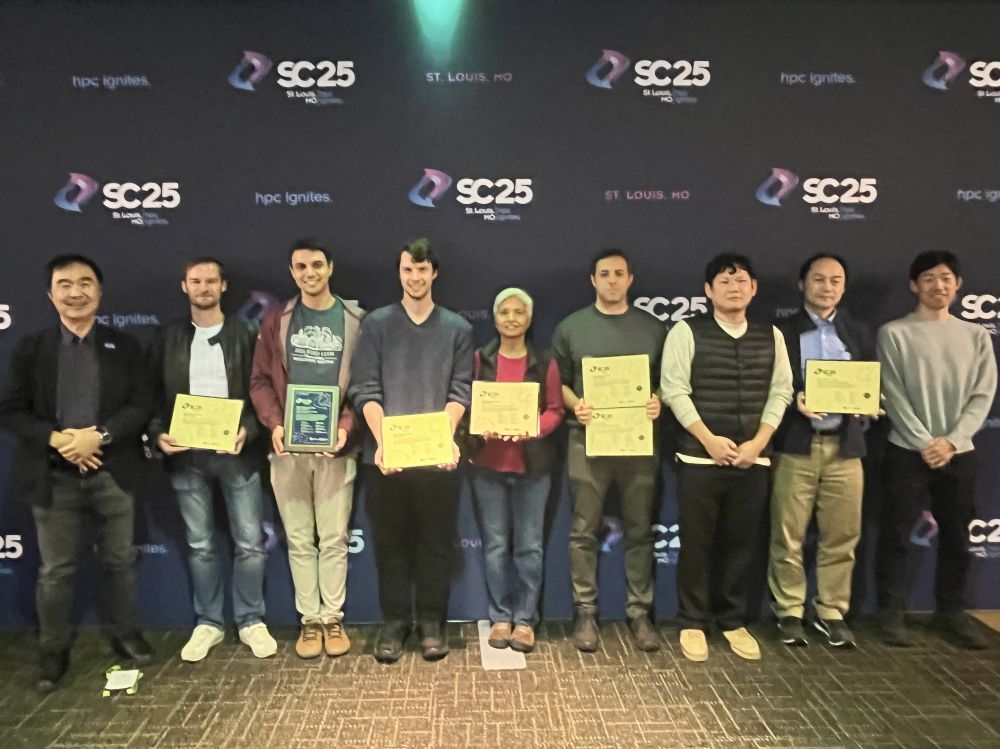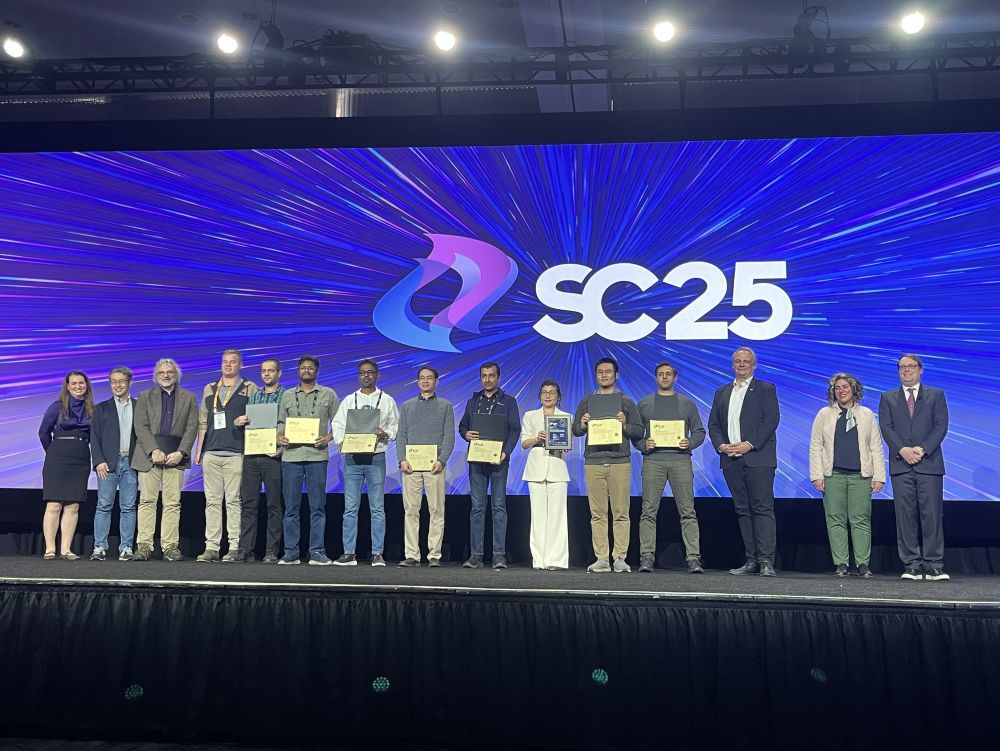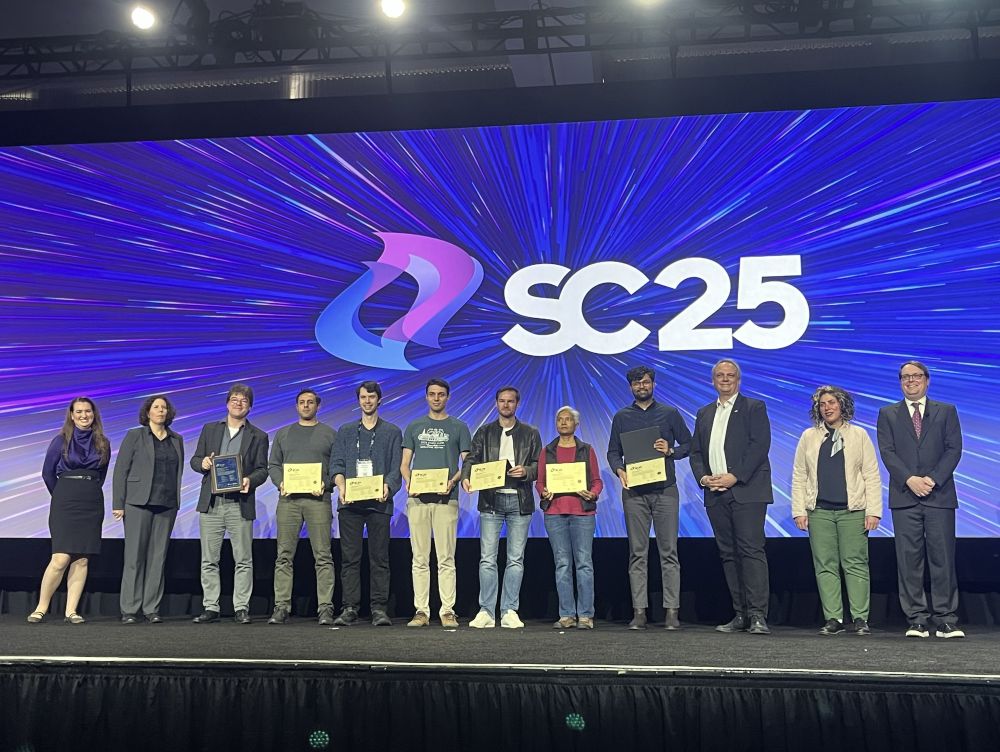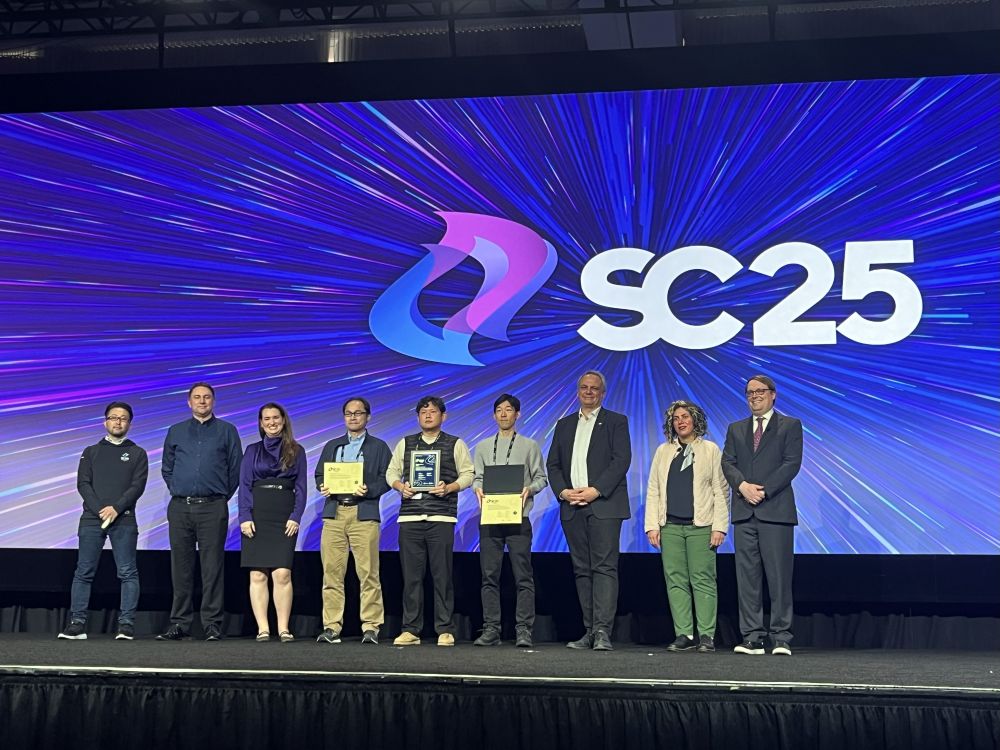TOP
 Events & Outreach
Events & Outreach
 News & Announcements
News & Announcements
 R-CCS Researchers Receive Three Major Awards at SC25: Best Paper Award, Best Reproducibility Advancement Award, and Best Research Poster Award
R-CCS Researchers Receive Three Major Awards at SC25: Best Paper Award, Best Reproducibility Advancement Award, and Best Research Poster Award
R-CCS Researchers Receive Three Major Awards at SC25: Best Paper Award, Best Reproducibility Advancement Award, and Best Research Poster Award
JapaneseAt SC25, The International Conference for High Performance Computing, Networking, Storage, and Analysis, held in St. Louis, Missouri, from November 16–21, 2025, the awards ceremony took place on November 20 (local time). Researchers from the RIKEN Center for Computational Science (R-CCS) received three major honors: the Best Paper Award, the Best Reproducibility Advancement Award*, and the Best Research Poster Award.
The number of paper and poster submissions to SC has been increasing every year, making acceptance itself extremely competitive. Earning two awards for papers and one for a poster in this context is a remarkable achievement that demonstrates R-CCS’s strength in the fields of high performance computing (HPC), artificial intelligence (AI), and quantum computing (QC) to the world.
In addition, R-CCS Director Satoshi Matsuoka received the HPCwire Readers’ Choice Award for Outstanding Leadership in HPC on the same day, further highlighting the high regard the community has for R-CCS as a whole.
- Best Reproducibility Advancement Award: Please refer to Best Reproducibility Advancement Award (SC25 Website) for details.
Award Remarks from R-CCS Awardees
Best Paper Award: R-CCS Team Principle Mohamed Wahib et al., "ORBIT-2: Scaling Exascale Vision Foundation Models for Weather and Climate Downscaling"
This award recognizes a major leap at the intersection of AI and exascale computing. ORBIT-2 demonstrates that foundation models can operate at true planetary scale, breaking long-standing barriers in vision transformers by achieving global climate downscaling at sub-kilometer resolution. By combining the Reslim architecture with the TILES parallelization strategy, the team enabled training of models up to 10 billion parameters across 65,536 GPUs, sustaining exaFLOP performance while preserving scientific fidelity. This collaboration between ORNL and RIKEN shows how tightly integrated AI–HPC research can directly impact climate resilience, risk planning, and next-generation Earth system modeling.
Best Reproducibility Advancement Award: R-CCS Student Trainee Faveo Hoerold, Junior Research Associate Ivan Radanov Ivanov, Team Principals Mohamed Wahib and Jens Domke, et al., "RAPTOR: Practical Numerical Profiling of Scientific Applications"
The push for faster, more capable AI is driving hardware vendors toward ultra‑low‑precision formats such as FP4. Yet most of our HPC modeling and simulation codes were written for higher‑precision types—FP64, FP32, or a mix—so the trend of dropping high‑precision support threatens scientific progress.
Our new RAPTOR tool lets researchers quickly and numerically profile existing applications to locate code and memory regions that can tolerate lower precision without sacrificing accuracy.
Winning the Reproducibility Advancement Award shows how readily RAPTOR can be adopted. We are especially proud of our exceptional students, whose ingenuity made RAPTOR possible, and thank our collaborators at ETH, Science Tokyo, UIUC, and ANL.
Best Research Poster Award: R-CCS Postdoctoral Researcher Sangwon Kim, Research Scientist Junya Onishi, Visiting Scientist Ayato Takii, Team Principal Makoto Tsubokura, et al., "Time-Stepping Hamiltonian Simulation for Solving Nonlinear PDEs via a Quantum-Classical Hybrid Approach"
It is a great honor for us to receive the Best Research Poster Award at SC25. Being recognized at a conference that plays such an important international role is a profound encouragement for our future research activities. This study explores a new framework for accelerating the time integration of nonlinear PDEs through a quantum–classical hybrid approach, and we believe it represents an important step toward next-generation large-scale simulations. We would like to express our deepest gratitude to all those who provided valuable comments and guidance throughout the development of this work. This award will further motivate us to advance our research and continue its development.
Related Link
(Nov 22, 2025)




